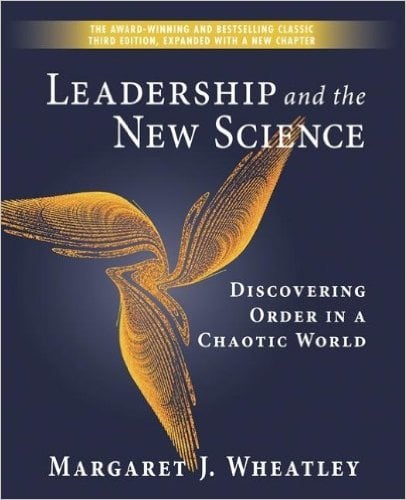By John Hunter, author of the Curious Cat Management Improvement Blog.
Leadership and the New Science: Learning about Organizations from an Orderly Universe by Margaret Wheatley does a good job of exploring how to view organizations as a system.
A quote by Meg Wheatley from an interview long after the publication of the book does a good job of capturing the ideas explored in the book:
How do you understand a world in which the only material form is that of relationships, and where there is no sense of an individual that exists independent of its relationships? That was the gift of the quantum worldview. It said there are no independent entities anywhere at the quantum level. It’s all relationships. That was something that made a lot of sense to how we were starting to think about organizations — as webs of relationships.
But the real eye-opener for me was to realize how control and order were two different things, and that you could have order without control. That was a major shift in my own thinking that I certainly discovered through the science.
The new science aspect provides the frame of reference of quantum physics and chaos theory. These echo the idea that relationships and systems define outcomes much more than adding together individual contributions. The results we experience are not the outcome of summing together the individual efforts (so ingrained in the thinking behind performance appraisals; assigning specific targets to be achieved to individuals, teams or departments etc.) instead results emerge from a system.
Naturally these ideas resonate very well with Deming’s thoughts and therefore it is one of the books I, and many others interested in Deming’s ideas, took to heart when it was published.
This is not a book of conclusions, cases, or exemplary practices of excellent companies. I no longer believe that organizations can be changed by imposing a model developed elsewhere. Second, there are no recipes or formulas, no checklists or advice that describe “reality.” There is only what we create through our engagement with others and with events. Nothing really transfers; everything is always new and different and unique to each of us.
That quote from the book (page 7, 1st edition) should ring true to those familiar with Deming’s ideas.
Leadership and the New Science provides an excellent view of the value of understanding the importance of interactions, emergence and systems thinking to those interested in leading organizations.
Related: Creativity Inc. – Using Deming’s Ideas at Pixar – People Copy Examples and Wonder Why They Don’t Succeed – Systems Thinking: Feedback Loops



